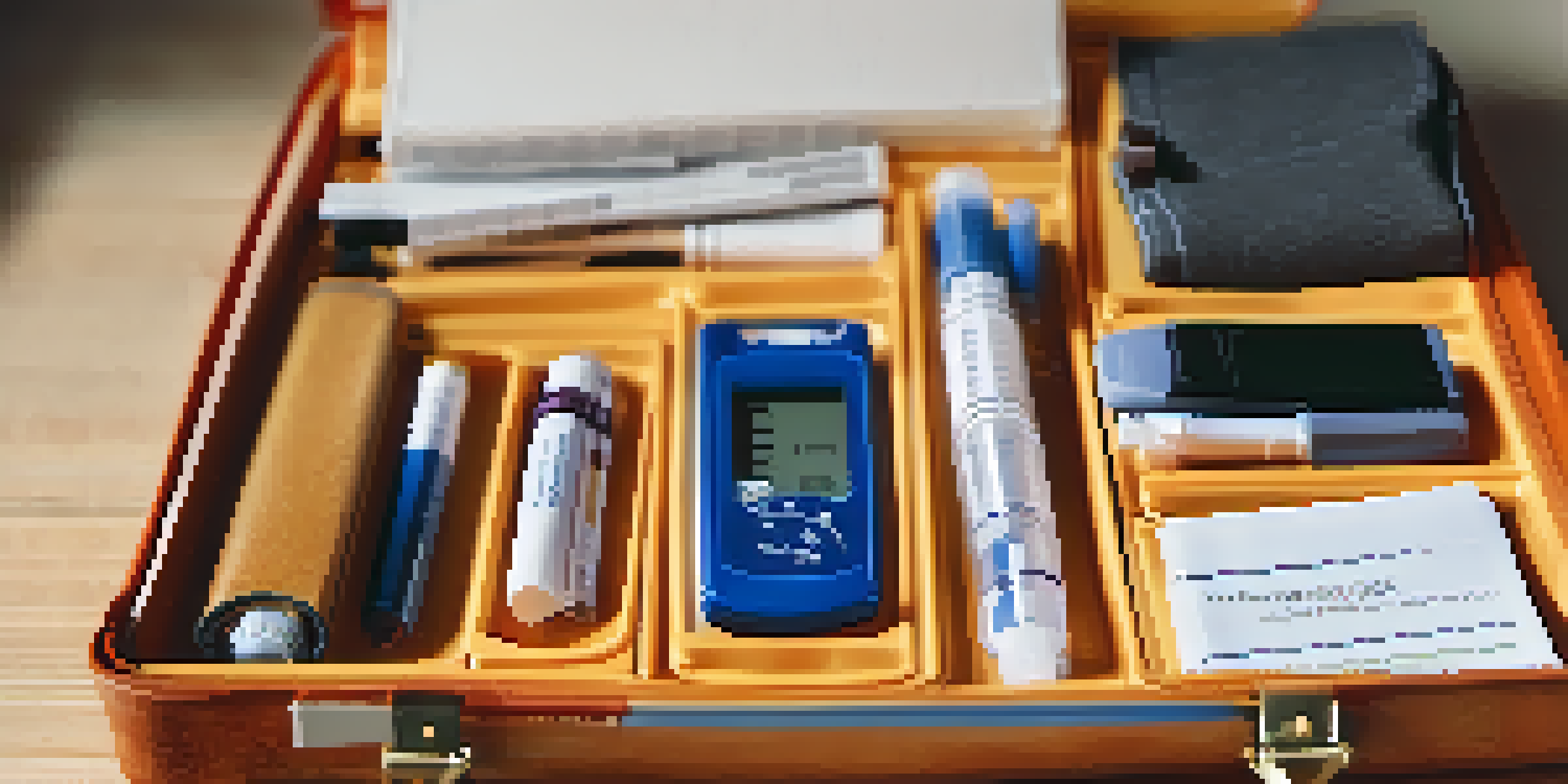The Importance of Regular Blood Sugar Monitoring for Diabetics

Why Blood Sugar Monitoring is Essential for Diabetics
For diabetics, keeping track of blood sugar levels is crucial for managing their health. Regular monitoring helps individuals understand how different foods, activities, and stress affect their glucose levels. By staying informed, diabetics can make better lifestyle choices and avoid potential complications.
The greatest weapon against stress is our ability to choose one thought over another.
Think of blood sugar monitoring as a weather forecast for your body; just as you check the weather to plan your day, monitoring your blood sugar prepares you for managing your diabetes. It provides insights into how your body responds to various stimuli, allowing you to adjust accordingly.
Additionally, consistent monitoring helps healthcare providers tailor treatments and medications effectively. When your doctor has accurate data, they can make informed decisions to optimize your diabetes management plan.
The Benefits of Frequent Blood Sugar Checks
Frequent blood sugar checks lead to better awareness of your condition. When you regularly monitor your levels, it enables you to recognize patterns over time, such as how certain meals or activities impact your blood sugar. This knowledge is empowering and can improve your overall health.

For instance, if you notice that your blood sugar spikes after certain meals, you can make adjustments to your diet. Small changes, like swapping out a regular soda for water, can have significant long-term effects on your health.
Monitor Blood Sugar Regularly
Regular blood sugar monitoring helps diabetics understand how their lifestyle choices affect their glucose levels.
Moreover, regular monitoring can help prevent dangerous situations like hypoglycemia or hyperglycemia. By catching fluctuations early, you can take action before they escalate into serious health issues.
How to Monitor Blood Sugar Levels Effectively
Monitoring blood sugar levels can be done through several methods, including traditional fingerstick tests and continuous glucose monitors (CGMs). Fingerstick testing is often straightforward and quick, while CGMs provide real-time data throughout the day.
It's not about perfect. It's about effort. And when you bring that effort every single day, that's where transformation happens. That's how change occurs.
Choosing the right method depends on your lifestyle and preferences. For example, a busy individual might prefer a CGM for its convenience, while someone who enjoys the simplicity of fingersticks may stick with that method.
Regardless of the method you choose, consistency is key. Establishing a routine for checking your blood sugar can help ensure you stay on track with your diabetes management.
Understanding Blood Sugar Targets and Goals
Setting specific blood sugar targets is an essential part of diabetes management. These targets can differ from person to person based on age, medical history, and other factors. Understanding your individual goals can help you maintain optimal health.
Your healthcare provider can help you determine what your blood sugar targets should be. Having clear goals not only motivates you but also provides a benchmark for assessing your progress.
Diet Influences Blood Sugar Levels
Choosing the right foods, like whole grains over refined options, can significantly improve blood sugar control.
For example, if your target is to keep your fasting blood sugar below 100 mg/dL, you can adjust your diet and lifestyle accordingly. This focused approach can greatly enhance your quality of life.
The Role of Diet in Blood Sugar Management
Diet plays a vital role in blood sugar management for diabetics. Foods high in carbohydrates can cause blood sugar levels to spike, while proteins and healthy fats can help maintain a more stable level. Understanding how different foods affect your body is crucial.
For instance, incorporating whole grains instead of refined grains can lead to better blood sugar control. Whole grains digest more slowly, providing a steadier release of glucose into the bloodstream.
Moreover, keeping a food diary can be helpful. By tracking what you eat alongside your blood sugar readings, you can identify which foods work best for your body and make informed dietary choices.
Exercise and Its Impact on Blood Sugar Levels
Regular physical activity is another essential component of blood sugar management. Exercise helps improve insulin sensitivity, which means your body can use insulin more effectively. This can lead to lower blood sugar levels over time.
Even simple activities like walking can have a positive impact. For example, taking a brisk 30-minute walk after meals can help lower post-meal blood sugar spikes.
Communicate with Healthcare Team
Effective communication with healthcare providers ensures tailored diabetes management and fosters better outcomes.
Ultimately, finding an enjoyable form of exercise can provide both physical and mental health benefits, making it easier to incorporate into your daily routine.
Communicating with Healthcare Providers About Blood Sugar
Effective communication with your healthcare team is vital for managing diabetes. Regularly sharing your blood sugar readings, lifestyle changes, and any concerns can help your provider make informed decisions about your care. This teamwork is essential for successful diabetes management.
Don't hesitate to ask questions about your treatment plan or suggest adjustments based on your monitoring results. For example, if you notice consistent high readings after breakfast, bring it up during your next appointment to explore dietary changes together.

Remember, your healthcare team is there to support you. Building a trusting relationship with them can lead to better outcomes and help you feel more confident in managing your diabetes.